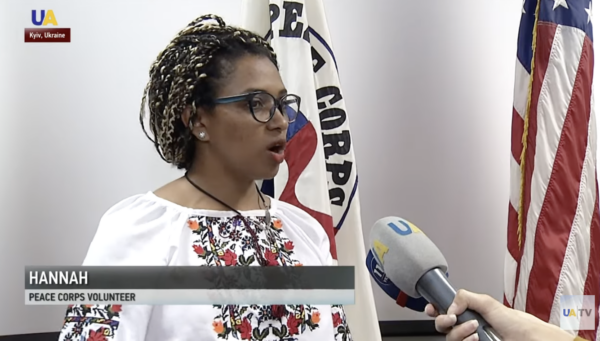Some corners of social media are in an uproar over the U.S. Peace Corps guidance on handling racism in Ukraine.
Peace Corps positions in Ukraine are currently not open, but Black Peace Corps volunteers who applied were warned to be prepared to be called the N-word and face other racist behavior while in Ukraine, according guidance on the Peace Corps website that is currently being discussed on social media.

The warning, which includes personal accounts from volunteers, calls for having thick skin and an understanding that the racial discrimination comes from Ukrainians’ lack of exposure to Black people.
“It is not uncommon for Ukrainians to refer to African-Americans as “[N-Word]”. Volunteers of color may be called ‘a monkey’ or may see children’s games with Blackface,” one volunteer wrote.
“Being aware of the history of dehumanization for people of African descent may help inform where this comes from; it does not justify it. It will be at your discretion to determine the intent.”
The warning builds on the recent reports of discrimination against African students in Ukraine, choosing to study in the country for cheaper living and more accessible education. U.S. Peace Corps volunteers have been in the country since 1992, teaching English and helping Ukrainians with financial, media and civic literacy, HIV awareness and other “community development” initiatives.
The Peace Corps advised volunteers that as Americans, they may be considered “the outsider.”
The organization trains volunteers how to “engage appropriately” and “effectively” across cultures and find “common ground” with the people they will be serving.
However, Black volunteers may face “far more complicated issues,” according to an account from an unnamed volunteer. The organization blames the discrimination on Ukrainians’ lack of exposure to Black people and a preconception that all Americans are white.
“Their understanding of African-American culture is fueled by the media and African stereotypes. You will generate lots of interest and curious stares,” the volunteer wrote.
“So, these stares can make you uncomfortable and annoyed. Ukrainians’ initial perception of you may be that you are from Africa; it may not. It does help if they understand that you are an American, and the training in PST will help you consider ways that you will engage with these assumptions.”
The Corps also said volunteers could be mistaken for university students, which have suffered the social cost of racism in recent months, blocked from fleeing the country as tensions between Russia and Ukraine erupted into violence and chaos.
According to data, about 16,000 international college students in Ukraine in 2020 were from Africa. Even though the students contribute millions of dollars to the country’s economy through their pursuit of higher education, many reported being shunned by Ukrainian officials in favor the host nation’s women and children when they tried to leave the country amid Russian attacks in February.
Africans were barred access to buses and other forms of transportation to the border and stranded in the cold as nationals followed a Ukrainian-first policy, with Ukrainian men between 18 and 60 not being allowed leave.
Even when Africans made it to the borders, at times, from traveling miles on foot, they were often turned back by Polish or Romanian guards. Several videos of the harsh treatment went viral online. A new report shows many Black people fleeing Ukraine are being held in prison-like facilities across Europe.
History shows that the recent treatment at the country’s borders is just a fragment of Ukraine’s racist record. The U.S. State Department has warned against travel to Ukraine by ethnic minorities, and human rights groups have expressed concern about hate crimes for more than a decade.
The Ukrainian government adopted a law in 2009 that raised the penalty for hate crimes motivated by race and national origin following a series of racial killings of African and Asian immigrants in 2007.
In 2020, three students from the Democratic Republic of Congo were attacked by five men as they tried to stop a taxi in Kyiv, according to the U.S. Department of State report.
Data show that 203 hate crimes were reported in Ukraine in 2020, of which 32 were motivated by racial bias and xenophobia. The overall number of hate crimes increased from 2016 to 2019, data also show.
The disclaimer have been retweeted more than 10,000 times. Many on Twitter appeared surprised about the details in the disclaimer. Some have rebuked the Peace Corps for not doing more to protect Black volunteers.
Journalist and former Peace Corp volunteer Terrell Starr said he was stopped 29 times while living in Ukraine, and no one would rent him an apartment while he was there.
The Peace Corps recommends that the Black volunteers react to racism in various ways depending on the situation. They can choose to “remove themselves” from the situation, get help from other volunteers or staff, or practice self-care or coping strategies.
“Sometimes they may explore if they can turn the situation into teachable moments for themselves and the host country national,” the Corps said.
On the other hand, a Detroit army veteran who served in the Peace Corps in Ukraine said he made a connection with people in the country. M. Dujon Johnson told reporters he felt compelled to go to Ukraine to help with the fight against Russia.
Johnson served in the Peace Corps in Ukraine from 2018 to 2020. He sees himself as a global citizen.
“I don’t expect people to go over to Ukraine or China or Ethiopia to practice what they preach,” told Fox 2. “But your neighbor who’s elderly you could try shoveling their snow, or try looking out for that child who crosses the street. It’s simply a global extension of how American should believe.”


